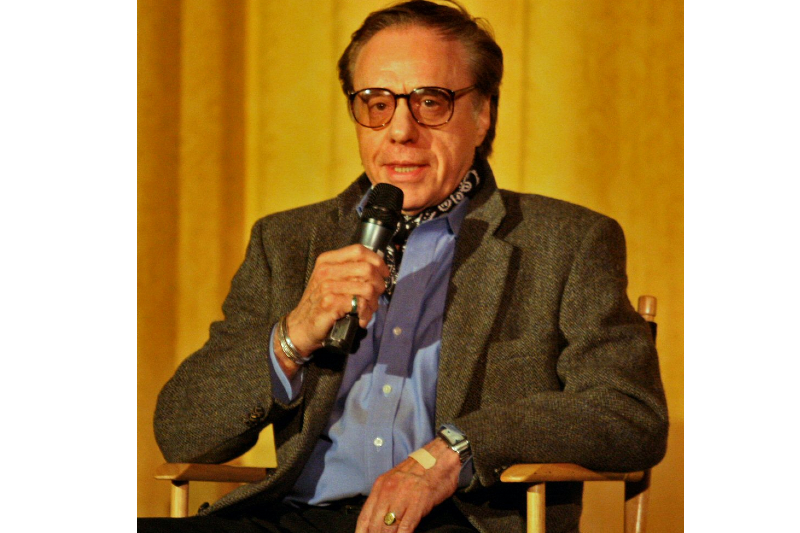Director Peter Bogdanovich lived the true Hollywood story of fame and repute found, lost, and refound. In a career that spanned massive swings, Bogdanovich died from Parkinson’s disease, after a long career as a relevant Hollywood actor, director, essayist, and historian, on January 6.
The Manual readers might know Bogdanovich for his recurring role on The Sopranos as Dr. Elliot Kupferber, the psychiatrist who treats Tony’s Soprano’s psychiatrist Jennifer Melfie (Lorraine Bracco). What they may not know is that Bogdanovich also spent the 21st century winning numerous awards and cinema acknowledgments.

One of the more influential “New Hollywood” directors in the 1970s, Wes Anderson, Sofia Coppola, and Noah Baumbach are just the beginning of the rolling list of filmmakers influenced by the late Bogdanovich. Quentin Tarantino even cast Bogdanovich as a deejay in Kill Bill: Vol. 1 because of the iconic director’s voice, heard most famously in his most critically acclaimed film, The Last Picture Show, from 1971.
The film, an ode to Bogdanovich’s old Hollywood mentors, set off a string of wild success, high-profile romances, and a decades-long rollercoaster ride where the ‘maverick’ director went from lauded to lambasted after a series of creative debacles. Hollywood was the one thing that Bogdanovich wouldn’t divorce, though, enduring to witness the next generation of directors influenced by his true belief in the magic of movies.
Born in 1939, Bogdanovich grew up idolizing what he described as Hollywood’s ‘Golden Age,’ from 1912 to 1962. He idolized old Hollywood directors like Alfred Hitchcock and John Ford. Bogdanovich even hosted Orson Welles for a time in the early 1970s, hosting him in a wing in his Bel-Air home.
Related Guides
- Classic Films
- Best Comedy Movies
- Best Netflix Shows and Series
- Best Books of 2022
Like many shooting stars, Bogdanovich had already found his light when he became a director in his own right. After moving to Hollywood in 1966, the young man used journalism and grit to work his way into the industry. Once he’d worked his way to the top, Bogdanovich eschewed New Hollywood contemporaries like Francis Ford Coppola, Steven Spielberg, and Michael Cimino. Instead of envisioning the medium’s future, he fought to keep Old Hollywood’s legacy alive, as Vulture noted in his quote to the New York Times in 1971.
“I don’t judge myself on the basis of my contemporaries. I judge myself against the directors I admire — Hawks, Lubitsch, Buster Keaton, Welles, Ford, Renoir, Hitchcock. I certainly don’t think I’m anywhere near as good as they are, but I think I’m pretty good.”
Being held up as one of the greats in his thirties led to a hard fall for Bogdanovich through a series of critical flops throughout the decade and a high-profile split with Cybil Shepherd, whom he cast in The Last Picture Show.
After modest success in the 1980s and 1990s, penning several Hollywood history books along the way, Bogdanovich turned to acting and voice acting in the 2000s, even appearing as Bart Simpson’s therapist in The Simpsons. In addition to books and blogs, the director turned in significant late-career success as a documentarian, as with 2007’s Tom Petty documentary, Runnin’ Down a Dream, and, in 2018, with The Great Buster, a documentary about Buster Keaton.
His life at once a cautionary tale and a narrative about abiding reality, Bogdanovich lived life on his terms, even if that meant the world would turn against him at times. This was evident in a 2002 interview with The New York Times.
“I’m not bitter,” he said. “I asked for it. Success is very hard. Nobody prepares you for it. You think you’re infallible. You pretend you know more than you do. Pride goeth before the fall.”
Bogdanovich is survived by daughters Antonia and Alexandra, three grandchildren, and a sister, Anna Bogdanovich.
Read More: ‘Many Saints of Newark’ Preview Fills in ‘The Sopranos’ Tragic Backstory



